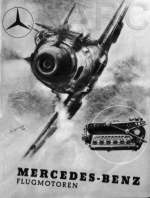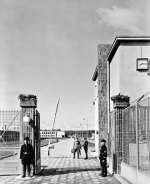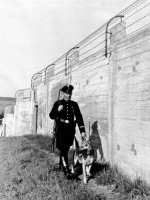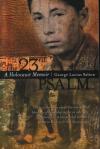 |
 |
 |
 |
 |
 |
| Stamp |
 |
| Advertisement |
In 1941 both companies employed approximately 2,000 people, among them more than 600 Jews with considerable technical experience who were housed in a prisoners camp which was integrated into the overall factory grounds but outside the wall which enclosed the complex.
The prisoners wore civilian clothing; conditions of hygiene and the supply of food were relatively good in comparison with most other forced labour camps in occupied Poland. As a consequence, the death rate at the camp was similarly relatively low.
From the summer of 1942 until about September 1943, the camp was guarded and operated by the Daimler-Benz factory police. In September 1943, the guarding of the camp was taken over by the SS but the prisoners continued to work under the supervision of the factory police.
The survivor George L. Salton related in his moving book:
 |
| Entry Gate * |
A tall German officer in an SA uniform and a civilian in a brown suit arrived to inspect us. We stood silently and kept our eyes to the ground. The German looked at us with contempt and spoke German in a harsh tone: "Jews, here we manufacture engines for the German air force. You are here because you supposedly have metalworking skills. We will find out if this is true when we put you to work. If you have deceived us, you will be more than sorry..."
 |
| Camp Guard * |
With the blanket rolled up under my arm, I went to Barracks Number 2. Inside were wall-to-wall long, shelf-like wooden platforms. I realized that we were to sleep on these and that I had to find a space to claim...
... My life was difficult. Each morning we were awakened with shouts and driven outside to stand and wait for the putrid substitute coffee. We had nothing to eat unless we saved a little bread from the evening meal. At night, after the prisoners were counted, we were given a bowl of watery cabbage or turnip soup and a small chunk of coarse bread. I slept on the hard wooden shelf, in a tight space between other men. I had to keep watch over my bowl, because I would get in trouble if I had to get another one. My clothing was dirty and shabby. Our bunks were infested with every imaginable bedbug. I used the cold water in the camp to rinse my hands and face but had no way to clean my body. Luckily, I did not yet need to shave. Other Jewish prisoners had to struggle with a few shared rusty razors. If they showed any signs of a beard, they exposed themselves to abuse by Germans who tortured them as religious Jews. The factory police were mean and abusive. They hit us with their clubs and truncheons and kicked us if we did not march in step or remove our caps quickly enough in their presence.The guard we called the Hawk was especially violent and hit us with his rifle every time we came within striking distance. I dreaded going to the factory when the Hawk or other brutal guards were on duty. I was beaten and kicked as I passed through the gates...
The Jewish orderlies announced that we would start working day and night shifts. We were divided into two groups. The day shift worked from six in the morning until six in the evening and the night shift from six in the evening until six in the morning. We would switch from day to night shift every week during the Sunday afternoon break...
... The night after the Rawa Ruska Jews arrived in the camp, my friend Katzenfliegel told me that he was going to see the new prisoners and ask whether they knew anything about the Jewish families resettled from the ghettos of Rzeszow, Przemysl, and Debica. It was forbidden for prisoners to walk from barracks to barracks after dark. I warned him to be careful, and he slipped out the door. A few minutes later Katzenfliegel came running back. Something was very wrong. "What's the matter? What happened?" I asked. Katzenfliegel was so upset that he could not speak. Others gathered around him. They pressed him for news. Finally, he spoke. "The Rawa-Ruska Jews are fools and liars! Yes! Yes, they are liars!" The prisoners standing around asked, "Why? What did they say?" Katzenfliegel answered in a choked voice. "They say that we are stupid to believe the Germans. They say that we have been deceived, that there never was any Ukrainian farm. They say that all our people, all our families, were sent to Belzec, a camp near Rawa-Ruska, where everyone was killed with poison gas."
We listened in stunned silence...
In September (1943) the SS took command of the camp operation. Oberscharführer Oester became the commander, and a troop of Ukrainians was brought in to serve as guards. Oester was the former deputy to Schupke, the German commander of the Rzeszow Ghetto.
Oester inspected the prisoners, barracks, and washroom at random. He carried a heavy truncheon and struck at anyone within his reach. He would punish an entire barracks for the slightest reason. He denied us our meals and made us stand in roll call for hours in the worst weather. He liked to point his pistol at our heads and threaten to shoot us...
The Ukrainians were happy to be our guards. They were often drunk, which made them eager to shoot at the Jewish prisoners...
In the early spring of 1944 a new group of about one hundred prisoners was brought to the Reichshof camp from another camp called Budzyn. Most prisoners were young German Jews who had been deported to the Minsk Ghetto from Germany many years before... They were in terrible physical shape, and I wondered how long they would survive in our camp, which now held nearly five hundred Jewish prisoners from all over Europe.
 |
| A Holocaust memoir |
Source: George L. Salton. The 23rd Psalm: A Holocaust Memoir, The University of Wisconsin Press,
Madison, 2002
ISBN 0-299-17974-5 (pbk.)
In spring 1942 George L. Salton (Lucek Salzman) and his family from Tyczyn in Poland were forced to move into the Rzeszow Ghetto. From there he was deported to ten different concentration camps. His parents perished in Belzec; his brother Manek never returned after having joined Polish partisans.
"This is a book to be read and passed down to our children to read."
- M. Lerman, Chairman Emeritus, USHMM -
© ARC 2005